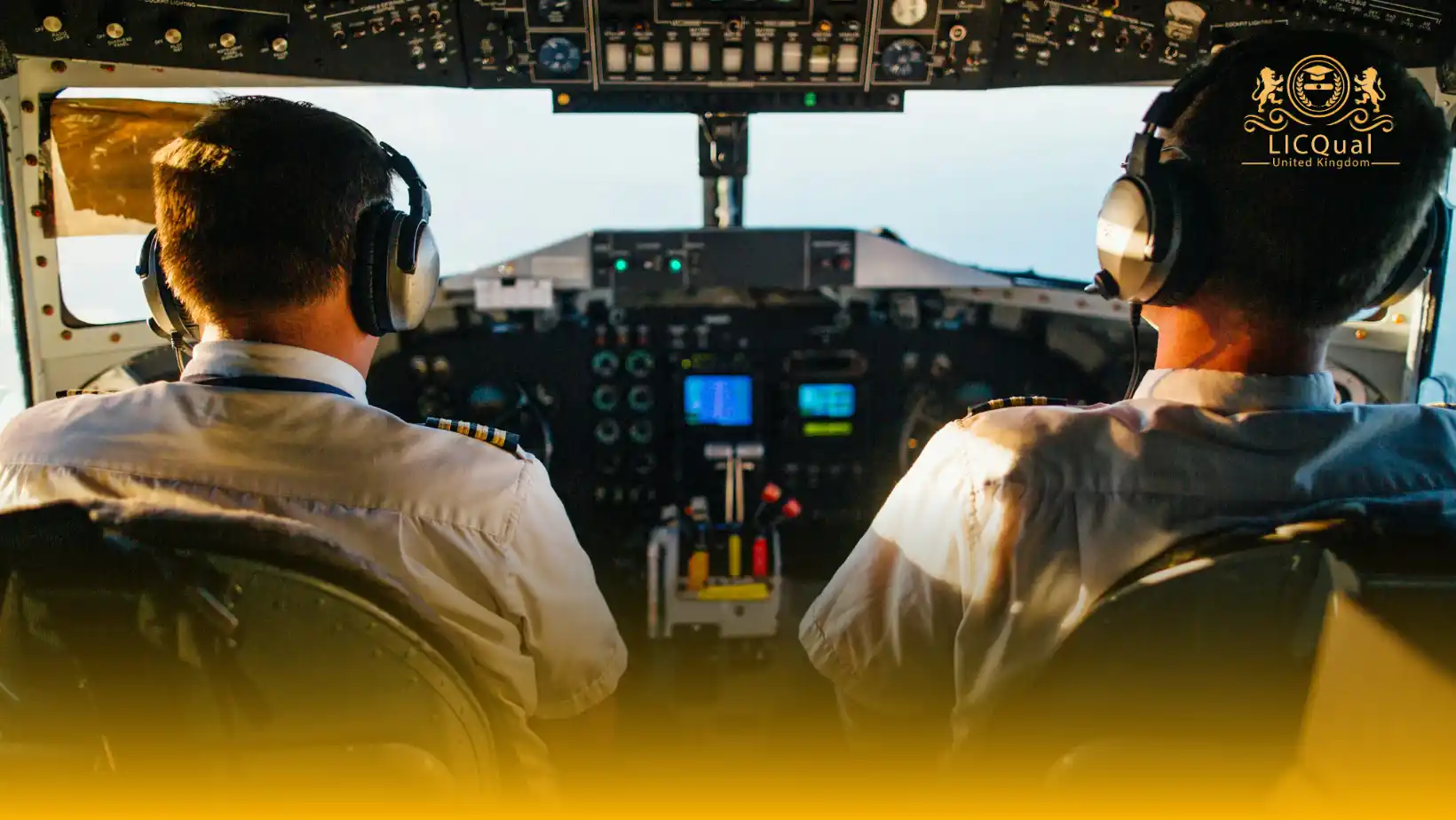The LICQual UK Level 3 Certificate in Airport, Airline and Aviation Safety is a UK‑accredited qualification designed for learners who want to build a strong foundation in aviation safety, airline operations, and airport security. This internationally recognized Airport and Airline Safety Certificate provides essential knowledge and practical skills for those seeking to start or advance their careers in the aviation industry.
Airports and airlines operate in one of the most highly regulated environments in the world, where safety and compliance are critical. The Level 3 Certificate in Airport and Aviation Safety UK introduces learners to the principles of aviation safety management, airline operations, and international compliance standards. By completing this Aviation Safety Certificate Level 3 qualification, students gain the confidence to work effectively in safety‑focused roles across airports, airlines, and aviation support services.
The course covers key areas such as airport safety procedures, airline operational safety, aviation risk management, and international aviation regulations. Learners will also explore human factors, safety culture, and emergency response planning, ensuring they are prepared to meet the expectations of global aviation employers. With a curriculum aligned to ICAO, EASA, and IATA standards, this UK‑accredited Airport and Airline Safety Certificate ensures credibility and international recognition.
What makes the LICQual UK Level 3 Certificate in Airport, Airline and Aviation Safety unique is its accessibility and career relevance. It is suitable for school leavers, career changers, and professionals already working in aviation who want to formalize their skills with a recognized qualification. With flexible study options and a practical approach, this Aviation Safety Certificate opens doors to entry‑level and mid‑level roles in airport operations, airline safety, and aviation compliance.
If you are ready to begin your journey in aviation with a qualification that combines credibility, recognition, and practical expertise, the LICQual UK Level 3 Certificate in Airport, Airline and Aviation Safety is your pathway to success.
Course Overview
Qualification Title
LICQual UK Level 3 Certificate in Airport, Airline and Aviation Safety
Total Units
6
Total Credits
24
GLH
120
Qualification #
LICQ2201255
Qualification Specification
To enroll in the LICQual UK Level 3 Certificate in Airport, Airline and Aviation Safety, applicants must meet the following criteria:
|
Qualification# |
Unit Title |
Credits |
GLH |
|---|---|---|---|
|
LICQ2201255-1 |
Fundamentals of Airport, Airline and Aviation Safety |
4 |
20 |
|
LICQ2201255-2 |
Introduction to Airline Operations and Safety Procedures |
4 |
20 |
|
LICQ2201255-3 |
Aviation Risk Awareness and Hazard Identification |
4 |
20 |
|
LICQ2201255-4 |
International Aviation Regulations and Compliance Basics |
4 |
20 |
|
LICQ2201255-5 |
Human Factors and Safety Culture in Aviation |
4 |
20 |
|
LICQ2201255-6 |
Emergency Response and Crisis Management in Aviation |
4 |
20 |
By the end of this course, learners will be able to:
1. Fundamentals of Airport, Airline and Aviation Safety
By the end of this unit, learners will be able to:
- Explain the core principles of airport, airline, and aviation safety in line with ICAO standards.
- Differentiate between accidents, incidents, hazards, and risks in aviation contexts.
- Identify the global organizations responsible for aviation safety oversight (ICAO, IATA, EASA, FAA).
- Apply basic safety concepts to airport and airline operational environments.
- Recognize the importance of proactive safety culture in preventing aviation incidents.
- Demonstrate awareness of international safety frameworks and their application.
2. Introduction to Airline Operations and Safety Procedures
By the end of this unit, learners will be able to:
- Describe the structure and functions of airline operations departments.
- Explain the role of Safety Management Systems (SMS) in daily airline operations.
- Apply standard operating procedures (SOPs) to ensure safe and efficient flight operations.
- Evaluate the importance of ground handling, cabin safety, and flight crew coordination.
- Identify operational risks and propose basic mitigation strategies.
- Demonstrate understanding of how safety procedures support regulatory compliance.
3. Aviation Risk Awareness and Hazard Identification
By the end of this unit, learners will be able to:
- Define hazards and risks within the aviation safety management framework.
- Apply hazard identification techniques used in ICAO Safety Management Systems.
- Conduct basic risk assessments using qualitative and quantitative methods.
- Recognize common operational hazards in airports and airline operations.
- Recommend preventive measures to reduce safety risks in aviation environments.
- Demonstrate awareness of continuous monitoring and reporting systems for hazards.
4. International Aviation Regulations and Compliance Basics
By the end of this unit, learners will be able to:
- Explain the role of ICAO, EASA, FAA, and IATA in global aviation regulation.
- Identify key international treaties, conventions, and agreements governing aviation safety.
- Apply compliance principles to airline and airport operations.
- Recognize the importance of regulatory audits and inspections in aviation safety.
- Evaluate the impact of international law on airline and airport safety procedures.
- Demonstrate knowledge of how compliance supports global aviation safety standards.
5. Human Factors and Safety Culture in Aviation
By the end of this unit, learners will be able to:
- Explain the role of human factors in aviation safety and accident prevention.
- Identify common human performance limitations affecting aviation operations.
- Apply Crew Resource Management (CRM) principles to enhance safety.
- Evaluate the importance of communication, teamwork, and decision‑making in safety culture.
- Recognize the impact of stress, fatigue, and workload on aviation safety.
- Promote a positive safety culture within airline and airport organizations.
6. Emergency Response and Crisis Management in Aviation
By the end of this unit, learners will be able to:
- Explain the principles of emergency response planning in aviation.
- Identify the roles and responsibilities of emergency response teams.
- Apply crisis management strategies to aviation incidents and disasters.
- Evaluate the effectiveness of emergency drills, simulations, and contingency planning.
- Demonstrate knowledge of passenger care, communication, and recovery procedures.
- Develop awareness of ICAO and IATA standards for crisis and emergency management.
The LICQual UK Level 3 Certificate in Airport, Airline and Aviation Safety is designed for learners who want to build a strong foundation in aviation safety, compliance, and operational procedures. This UK‑accredited and internationally recognized qualification is ideal for school leavers, career changers, and professionals seeking to enter or progress in the aviation industry. With its focus on airport safety, airline operations, and global aviation standards, the course prepares learners for diverse roles across the aviation sector.
1. Aspiring Aviation Professionals
- Individuals looking to start a career in airport, airline, or aviation safety.
- School leavers seeking a UK‑accredited qualification to enter the aviation sector.
- Learners aiming to progress toward higher‑level aviation diplomas.
- Those interested in building a foundation for airline operations and safety roles.
- Students motivated to pursue internationally recognized aviation careers.
2. Airport and Airline Staff
- Ground handling staff who want to strengthen their knowledge of safety procedures.
- Cabin crew members aiming to enhance their understanding of aviation safety.
- Airport operations staff seeking career growth through formal certification.
- Employees responsible for passenger safety and operational compliance.
- Staff preparing for supervisory or safety‑focused roles in aviation.
3. Aviation Safety Assistants and Coordinators
- Entry‑level safety officers looking to formalize their skills with a recognized certificate.
- Professionals supporting Safety Management Systems (SMS) in airlines or airports.
- Individuals tasked with hazard reporting and risk awareness in aviation operations.
- Staff working under compliance managers or safety supervisors.
- Learners preparing for progression into advanced aviation safety qualifications.
4. Career Changers and International Students
- Professionals from logistics, travel, or transport sectors transitioning into aviation.
- International students seeking a UK‑accredited aviation safety qualification.
- Individuals aiming to gain global recognition for entry into the aviation industry.
- Learners who want a flexible pathway into higher‑level aviation studies.
- Career changers motivated to pursue long‑term roles in aviation safety.
5. Government and Regulatory Support Staff
- Junior staff in civil aviation authorities or regulatory bodies.
- Individuals supporting compliance audits and inspections.
- Professionals assisting in the enforcement of aviation safety regulations.
- Staff working with ICAO, EASA, or national aviation frameworks.
- Learners preparing for future roles in aviation law and compliance.
6. Aviation Training and Support Personnel
- Trainers and instructors delivering basic safety awareness programs.
- Aviation support staff involved in safety briefings and inductions.
- Professionals responsible for maintaining safety documentation and records.
- Individuals supporting emergency planning and response teams.
- Staff aiming to enhance their credibility with a recognized certificate.
7. Travel, Tourism, and Hospitality Professionals
- Travel consultants and tourism staff working closely with airlines.
- Hospitality professionals supporting passenger safety and service.
- Individuals seeking to expand their career into aviation operations.
- Staff aiming to understand aviation safety standards for customer care.
- Learners preparing for cross‑industry roles in aviation and tourism.
Assessment and Verification
All units within this qualification are subject to internal assessment by the approved centre and external verification by LICQual. The qualification follows a criterion-referenced assessment approach, ensuring that learners meet all specified learning outcomes.
To achieve a ‘Pass’ in any unit, learners must provide valid, sufficient, and authentic evidence demonstrating their attainment of all learning outcomes and compliance with the prescribed assessment criteria. The Assessor is responsible for evaluating the evidence and determining whether the learner has successfully met the required standards.
Assessors must maintain a clear and comprehensive audit trail, documenting the basis for their assessment decisions to ensure transparency, consistency, and compliance with quality assurance requirements.







